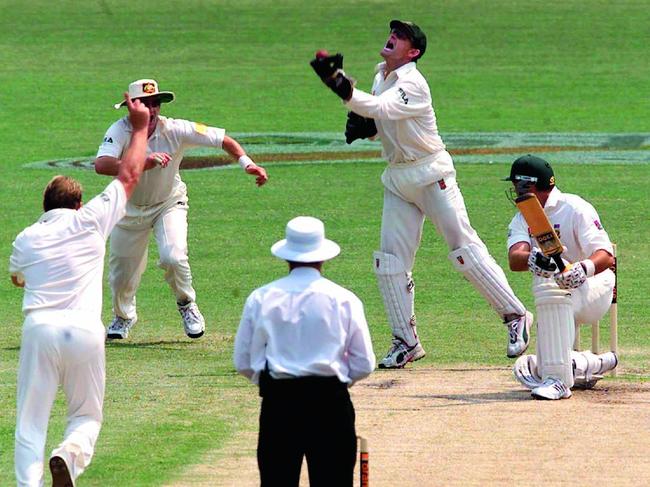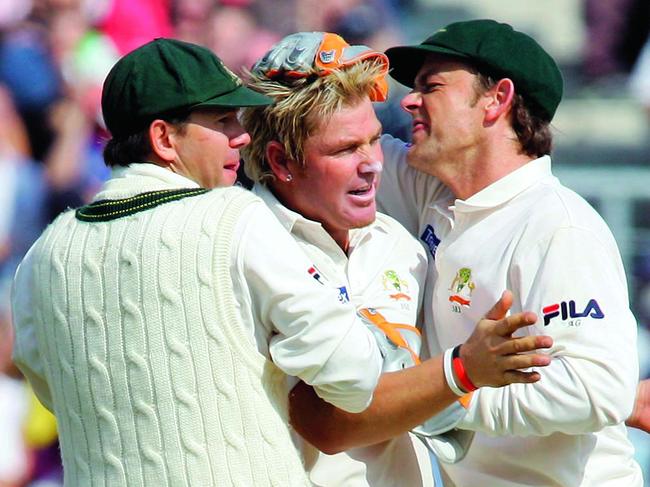Church and Warnie, together in the commentary box? Expect fireworks
Cricket’s black knight and white knight, together in the commentary box. How are Warne and Gilchrist getting past all the bad blood?

He blows in like a walking bush ballad, half-written. Mulga Bill from Eaglehawk. Clancy of the Overflow. Shane Warne of south-east Melbourne. “Warniiieee!” gasps someone not famous. He nods. Better believe it. The smile: twinkling. The hair: advanced. Here’s his whole adult life in a rhyming couplet: The people came from far and wide to marvel at his tricks. But the boy could never seem to hide from all those camera clicks. Here’s five precious spinning fingers on his big right hand that transformed the game of cricket, dipping into a cup of green and gold jelly beans. “Where’s Church?” he asks.
They’re not the best of mates. Never have been. There’s a history of bad blood between these two, not that we ever saw it on the field. Church had the best seat in the house during the playing days, hunched behind off stump watching that rough red ball turn, turn, turn and drift and zip and break; break the laws of physics; break the hearts of England’s children who spent the ’90s weeping.
“Church” goes way back. Late ’90s. Adam Gilchrist was pacing a cricket field in Derbyshire, England, with Steve Waugh and Glenn McGrath. A local boy by the fence wanted an autograph from Australia’s newest Test gloveman but he only vaguely knew his name. “Ummmm… Gilchurch?” the boy beamed, hopefully. Tugga Waugh and Pigeon McGrath were looking for a nickname for Gilchrist. “Churchyyyy,” they rejoiced.
Here’s Church now, pushing through a soft-close commentary box door with his head stuck in a folder full of cricket notes. Bright white West Australian light bounces off the vast deep green Perth Stadium cricket oval, through the window of the commentary box and into the great keeper’s pale blue eyes that rise and rest momentarily on a bouncing pitch 20m long and 3m wide, just like all those other pitches around the world – from Lord’s to Lahore – where he once manufactured miracles. That time he stole the World Cup from Sri Lanka, hitting 149 off 104 balls – 13 fours and eight sixes. The 472 dismissals behind the stumps in One Day Internationals. That outrageous career run rate (81 per 100 balls in Tests, 96 in one-dayers) that made all those other swashbucklers – Keith Miller, Viv Richards, Ian Botham – look positively bashful.
“Gilly!” says Steve Crawley, the seasoned Head of Television at Fox Sports, who is overseeing a new era of televised cricket coverage after Foxtel and Seven announced in April that they’d jointly secured the $1.2 billion TV rights to broadcast international cricket for the next six years.

Old-blood Channel Nine cricket was dead and the new-blood networks scrambled to secure their commentary teams. Key target recruits were Gilchrist and his former Test captain Ricky Ponting, natural anchormen who had proven their “mediagenic” worth with successful host roles on Channel Ten’s Big Bash League coverage. Fox jagged Church and Seven jagged Punter and everybody wondered about the blond-haired boy wonder from Hampton, Victoria. Then Warnie followed his faith. Then Warnie went to Church.
“The reason we wanted Gilchrist and Warne together is we wanted the school captain and we wanted the guy around the back of the toilets having the smoke,” says Crawley. “That’s important in Australia because you’ve gotta have both of those things. You’ve got to have the scallywag and you’ve got to have someone people look up to.”
Cricket insiders rolled those names across their tongues. Warne and Gilchrist? Together in the commentary box? Black knight, white knight. Chalk and cheese. And what about their history?
A groan echoes across the stadium. Another early Australian wicket falls. Two for four against South Africa in the first local One Day International of the summer. There’s a lot in that groan. There’s inevitability in it; disillusionment. There’s a preposterous sandpaper cheating scandal in that groan. There’s a spontaneously combusting Cricket Australia board in it. Day one of Fox Cricket’s epic six-year gamble finds our newly crowned commentary kings – Gilchrist and Warne – narrating a sacred and perpetual summer stage play starring, for the moment, a central cast of characters in green and gold that the Australian public finds increasingly on the nose.
“It’s the first day at school for all of us,” says Gilchrist of the commentary team that includes fellow Test greats Mike Hussey, Mark Waugh, Kerry O’Keeffe, Allan Border and former England women’s cricketer and television wunderkind Isa Guha. The classroom is a sound-absorbing space the size of a squash court. Two statisticians track the game’s play at a long desk; in the corner of the room Warne, Gilchrist and the guest commentator, former South African captain Graeme Smith, slip on headphones and begin their next rostered half-hour bracket. Hovering somewhere unseen above all this is the ghost of Richie Benaud, politely asking all concerned if they might kindly avoid making a mess of televised cricket.
“Was that a bad shot or a good ball?” asks Warne, off-mic. Gilchrist smiles and shrugs. These are the sorts of questions Warne asked him from first slip for seven shared years of Test cricket, genuinely useful queries peppered with incessant non-essential puzzlers like, “All right, Church, top five action movies of the 1980s?”
“Body language is important here,” Warne says through his commentary mic. “Don’t let them dominate you. Don’t let them suffocate you.”
“Good point Warnie,” Gilchrist says. “There is a confidence crisis in Australian cricket.”
Another Australian wicket falls and Warne feels it physically, reels back in his commentary seat like he’s just witnessed a murder. “It’s all about rhythm,” he barks. “Right now, South Africa has all the rhythm. They’re not overstriding. They’re calm. That’s showing at the other end. It’s effortless. Pure rhythm.”

Pure rhythm. It’s also the secret to a thriving commentary team. That’s what Warnie and Church are searching for today. The rhythm. The flow. Every on-field and off-field moment they’ve shared in the past two decades will feed into that flow.
They have a history, these two. A complex, funny, triumphant, blokey, ill-communicative, occasionally fraught history that Warne traces to the heart of “the bullshit” that Australian cricket finds itself covered in today.
“It’s amazing how interested people are in our relationship,” Gilchrist says. “And what the perceptions of it are. We were having a chuckle about how much interest there will be… We thought we could possibly have a bit of fun with it. Have a big dust-up on day one, on camera. We chose not to go that way.”
Shadowing this first day like a game-delay rain cloud is the fact Gilchrist has been reading Warne’s latest tell-all book, No Spin. “I tell you,” he says later in a private empty room adjacent to the commentary box, “it feels exactly like Shane Warne is sitting in front of you talking to you. Then I read the line, ‘For all Gilly’s talent, jeez he pissed me off sometimes’. ” Gilchrist is the one reeling back in his chair now when he says this. “Bang!” he says, shaking his head. “He’s not covering anything up!”
There are few cricket minds as instinctive and insightful as Shane Warne’s. On air, he can tell the world exactly which pitch divot a ball should be landing on and exactly how to rip the ball with his all-powerful “revs” so it spins precisely the way he sees it in his head. On air, he’s untouchable because nobody sees what he sees.
“You know what Kerry Packer told me,” he says. “He was like, ‘Don’t tell me what I can see, tell me why it’s happening. Take me out into the middle and show me what it’s like’.” Packer wanted what Warne could see. “I like to think I bring people out there into the game. I want to give them another alternative to think about. I don’t always get it right. Sometimes I waffle on some different tangent, but more times than not I get it right.”
Off air, his actions speak louder than his words. You can see this across eight hours watching him in a small commentary box. The way he takes his headphones off and apologises to Isa Guha for accidentally making a commentary cross to the dressing sheds when it was her role to do so. The way he niggles one of his closest cricket mates, Mark “Junior” Waugh, and the way Junior rolls his eyes at him. Warne can’t stand Steve Waugh but he worships Junior: “If I had to pay money to watch someone play cricket, he’s my guy.” The way he approaches a tray of pastries like a bird of prey then pulls back in the last second of his approach. “Noooo!” he says, distraught. “Thought they were chocolate eclairs.”
Every interaction he has with someone new seems coloured by the fact most adult Australians can sing The Ballad of Shane Warne word-for-word. The endless triumphs on field; the off-field scandals; the Playboy underpants. There’s the briefest moment in every interaction when Warne sizes up the person before him, summons every ounce of his tournament poker face-reading abilities and assesses where that person falls on the love-him-or-loathe-him question. “I don’t do things to make people happy,” he says. “I don’t do things for people to form an opinion on me. People can make up their own mind about me. Good, bad, whatever. It’s not going to change my life.
“That’s one of the things I’m most proud of. I’ve never pretended to be something I’m not. I’ve always just been me.”
He owns every line of the ballad. He unashamedly owns his three key post-cricket passions: tournament poker, competitive golf and sexual intercourse. An online tabloid claimed this year to have uncovered Warne’s Tinder profile page, showing a tanned and shirtless beachside Warne above a two-word bio-cum-invitation that perfectly summarised his feelings on himself and life. “Why not!” it said proudly.
Ian Healy once advised Gilchrist, his Test keeper successor, on how to keep to Warne’s bowling. “Stay low, move late,” Healy said. Most members of that golden age Test team – the one Mark Taylor passed to Steve Waugh passed to Ricky Ponting – learnt soon enough that Healy’s advice could be applied to managing a relationship with the greatest bowler who ever lived. Stay low when he’s in a mood. Move late, always. Don’t jump to conclusions about Shane Keith Warne. That’s what the world did.
“They think I’m some sort of Neanderthal,” Warne says, in a quiet moment. “They think I’m uncouth. I can’t change their minds.”
There’s a pack of cigarettes and a lighter resting on his laptop. He laughs for a moment, recalling the 2006 team bootcamp in rural Queensland when an army drill sergeant instructed players to strip down to their underwear. Warne, who considered such team-bonding exercises a waste of time, stripped down to reveal the notorious Playboy jocks that were once splashed across English tabloids for a hidden-camera sex romp yarn. The instructor then told players to step forward from the line and place any medications on their backpacks. Mike Hussey stepped forward first and placed his asthma puffer on his kit. Then the esteemed Shane Warne from south-east Melbourne stepped forward and placed down five packets of cigarettes.
“I brought a lot of entertainment to people’s lives,” he says. “People were sitting on the edge of their seats saying, ‘What ball is he gonna bowl next?’ They loved watching me play cricket. But then suddenly I’m judged. I have this bad rap as…” He thinks on the word. “An idiot. It’s just not true.”
Warne knows the deal. The modern game called by the two men arguably most responsible for the way the modern game is played. Two sides of the cricket coin. Warne knows their roles. Wonder boy who would be king who fell and got back up again and fell again and climbed back up again to slide into his Ferrari. And the unblemished white knight who did something truly shocking. He played fair. He called himself out even when the umpires didn’t. He walked.
“Don’t let that squeaky-clean image fool you!” scoffs Warne. “Church can be naughty, don’t worry. He loved the beer. He drank as good as the rest of them and he didn’t mind a late night as well!”
“He’s just Hollywood superstar material isn’t he?” counters Gilchrist, flatly. “Whether he wants it or not, a walking headline. He’s had an intriguing, extraordinary life. And to have been on that journey with him has always been interesting.”

There were times, in truth, when it was Warne pissing Gilchrist off. If there was ever friction between the two it stretches back to a Sheffield Shield game in the late 1990s. Warne and his long-time wicketkeeper friend Darren Berry, playing for Victoria, were mercilessly sledging Gilchrist, who was at the crease for Western Australia. “Warnie and Darren Berry were absolutely giving it to me, verbally,” Gilchrist writes in his 2008 autobiography True Colours. “They were saying ‘A…-licker, you’ve only got where you are because you’re an a…-licker’. The nature of what they were saying was extremely hurtful. I felt it had a lot to do with me being above Chuck [Berry] in the pecking order behind Healy. Chuck might have envied me because of that and Warnie was Chuck’s best friend. But considering I’d played some cricket with Warnie for Australia, it was below the belt. At the time it almost killed me.”
The relationship was complicated further in 2000 when Warne lost the Australian vice-captaincy to Gilchrist after sending lurid text messages to an English nurse. Gilchrist, in an attempt to clear the air, asked for a private meeting with Warne in which he offered to help his teammate through any matter, sporting or personal. “Sure, Gilly,” said an affronted Warne, who didn’t take kindly to advice from his well-intentioned, if possibly ill-advised, junior. “Thanks. You do your thing, mate, and I’ll do mine.”
Warne later threw a coded dig at Gilchrist in his autobiography: “We do not want a Richie Cunningham figure in charge unless he is the best person. He was the character in Happy Days who was always polite and well-mannered, who said the right thing at the right time, but relied on the Fonz, a more confident, streetwise figure, to overcome his problems in the real world.”
“Look, I was just like, ‘Get on with it’,” Warne says today. “I didn’t need to be sat down like a schoolboy. I was just like, ‘Let’s get on with it. No problem with me whatsoever. Let’s just play.’”
An already complex relationship reached breaking point in 2003 when, in the wake of Warne’s infamous suspension for taking a banned diuretic supplied by his mum, Gilchrist made public comments suggesting Warne’s credibility had been negatively impacted by the saga. Warne finds blind veneration of the Baggy Green largely repellent – he consistently rebelled against pride-building requests by his former skipper Steve Waugh to wear the cap at various public events, most notably Wimbledon – but he believes a code exists between all who wear it that says players must support each other in public, always.
Gilchrist thinks on this moment today and sighs, visibly remorseful. “I said something in a press conference that gained a lot more attention than I intended it to,” he says. “About deception and deceiving the public. Whether that, on reflection, was reported correctly or incorrectly… it dawned on me that the last thing he needed at that time in his life, when his whole world had been flipped on its head, was a teammate adding any fuel to it.” He pauses, considers his thoughts, then lays down the facts of what it was like to swirl in the ever-expanding orbit of Shane Keith Warne. “I wasn’t the only player who felt like, ‘Oh, I’m in the bad books with Warnie’,” he says.

Gilchrist brings up John Buchanan, the former Australian team coach. “I’m a big John Buchanan fan and he’s not, and I might hear him saying something about him and might have just questioned it and then I’d feel a bit of a stony silence,” he says. “I’m not the only player in the team who felt that occasionally with Warnie. And we all just knew, and Warnie would say himself, he could get grumpy about things and he could say, ‘Right, I’m gonna say it honestly and if it pisses someone off, bad luck’. But then it wasn’t a case of being confrontational and making it a big blow-up. It was, like, ‘Step back, who cares? Next minute he’s taking his 700th wicket’. And you know the magic of that and we never let those moments get overridden by [disagreements].
“Warnie’s been outspoken about Steve Waugh,” Gilchrist continues. “I’m a big Steve Waugh fan. Doesn’t mean I want to sit down with him and, publicly or privately, say, ‘Warnie, you’re wrong, I’m right’. I don’t need to. He’s entitled to his own opinion and I’m entitled to mine. There are disagreements but not to a point that it’s going to end a relationship, a friendship.”
Buchanan predicts the inherent differences between the two cricket greats will become the secret to their on-air success. On the field, tension between players brings losses; in the commentary box, tension brings theatre. During his playing career Warne was always “a conditional team player,” Buchanan says. “Conditional meaning that because he was, in a sense, larger than life, such a huge presence, he was always the centre of attention and always wanted to be the centre of attention. Provided he had [that], generally by his deeds on the field, and things were going well, he was very much a team player. Caring, sharing, co-operative, collaborative – couldn’t do enough for people on the team. But, with a conditional team player, when things are not quite going your way, then… it’s everybody else’s fault, and particularly the coach.”
Warne, for his part, says Buchanan helped usher in the “analytics over common sense” approach to training that helped land the Australian Test team in the rut it’s in today. He often cites Buchanan slipping pages from Sun Tzu’s The Art of War under hotel room doors in 2001 as some kind of dark Australian cricket crossroads.
“I’m like everybody else now,” Warne says. “I’m sick of reading all the rubbish. I’m sick of hearing about these reports and these debriefs about what’s wrong. To me, it’s about hard work and basic cricket. If you want to catch better, hit more catches. You want to bowl better, bowl more balls. Go bat in the nets. Sports science, to me, is the biggest waste of money in all sports. Now we’re seeing ridiculous stuff like waking up in the morning and people saying, ‘How are you feeling today? Rate yourself out of 10’.” He shakes his head. “How are you feeling?”
Warne is certainly no fan of Buchanan but it’s Buchanan who can best crystallise what makes Warne such a compelling commentator. “Warnie would constantly be critical of me because I was making the game too complicated,” Buchanan says. “One of the things Warnie never appreciated about himself was actually how good he was. Other players I coached didn’t have the same capacity he had to remember the game.”
Warne, Buchanan says, had an “unbelievable capacity” to “compartmentalise” his extraordinarily chaotic life. “When it came to game day Warne just opened up the cricket compartment. In his cricket compartment he could open up the relevant files that he’d been storing for 10 or 12 years about an individual player or the ground he was playing on or a situation of the game. Other players couldn’t do that. The reason why he was thinking I was complicating the game was that we were actually trying to bring other players up to the speed where he was at. So I can understand why he says we were complicating it. In a sense we were for him, who was already there.”
Hell of a notion. What if everything Warne hates about the game today was brought about because of him? Cricket Australia wanted to build more boy wonders. But Warne couldn’t be built. Like any star fated to explode in the endless night, he was simply born.
No hiding it in the commentary box. This match has withered to a dry turd that Steve Crawley’s note-perfect broadcast team has managed to polish into eight hours of good television. Australia is all out for a paltry 152. The Proteas will barely need to shower before an early dinner. Crawley needs the boys to lift over summer. He needs great games that he can turn into spectacular television. “We’ve got the rights for six years,” he says. “It’ll happen. It will. Australians love a redemption story.”
Here’s one now. Shane Warne in a navy blue broadcast jacket, deep into the next wild stanza of a 30-year ballad. He’s on the mic talking to Church about a new and laughable buzz-phrase that’s been plastered across the dressing sheds by Australia’s coaching brains trust. “Elite honesty?” Warne howls, screwing his face up like he’s sucking on a rusty nail. Church swallows his laughter. “Can I cut to the chase here?” Warne asks. Gilchrist’s eyes light up, nodding. “Forget all the words,” Warne barks. “Forget the verbal diarrhoea. That’s just rubbish. It’s vomit. Cricket is a simple game and it’s a performance-based game. You have to perform on the field. All these words! It’s all about actions. Get the captain and vice-captain, they lead the way. The rest of the players come after you. You inspire through your performances. None of this writing words! Just get out and play better.”
Gilchrist locks into the conversational slipstream and lobs his complicated old Test mate another commentary full toss that the boy wonder smashes into the southern stand. They’re bouncing off each other. Easy communication.
There was a quiet moment just an hour ago when Warne was alone in the make-up room. He was reading a line from Gilchrist’s autobiography. “Keeping wicket to Warnie was the absolute highlight of my career,” he read. “The best thing ever.”
“I didn’t know that,” Warne said, genuinely taken aback. “We don’t speak much about that stuff.” He shrugged. “You just don’t.” For the briefest moment, the 24-7 neon light that shines around Shane Warne dimmed to something closer to a bedside reading lamp. “It was the highlight of his career,” he pondered, shaking his head.
In the commentary box, Church lobs another full toss and another and another and the two sides of the one cricket coin have found their groove. Vintage televised cricket. Pure rhythm.



